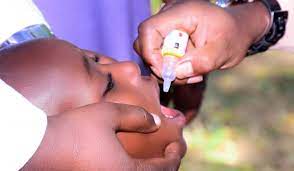APA – Kigali (Rwanda) – Rwanda has launched a comprehensive vaccination campaign against Polio 2, following reported cases of the disease in neighboring African countries, including Burundi, an official source confirmed Tuesday to APA in Kigali.
Paralytic poliomyelitis is a rare outcome and occurs when poliovirus enters the central nervous system and replicates in anterior horn cells (motor neurons) of the spinal cord or brainstem.
Type 2 poliovirus had been declared eradicated by the World Health Organisation (WHO) in September 2015, leading to the removal of its vaccine from international vaccination programs in 2016.
In response, Rwanda’s Ministry of Health, in collaboration with UNICEF and WHO, has launched a 5-day vaccination campaign targeting children below the age of 7 years, as they were born after the Polio 2 vaccine had been removed from the regular vaccination schedule.
Hassan Sibomana, the Acting Division Manager for Maternal, Child, and Community Health at Rwanda Biomedical Centre (RBC), told local media that the aim is to reach out to more than 2.7 million children in Rwanda within the designated 5-day period.
“Vaccination is of utmost importance in preventing polio. Rwanda has been fortunate to be free from polio cases for over 30 years, thanks to the effectiveness of vaccines,” Sibomana explained.
Polioviruses are human enteroviruses with serotypes 1, 2 or 3. The incubation period is usually 7–10 days (range 4–35 days). Most people infected with poliovirus do not have symptoms, though they can still excrete virus in faeces and, for a shorter time, in saliva.
Approximately one-quarter of those infected develop minor, transient symptoms including fever, headache, malaise, nausea, vomiting and sore throat, it said.
CU/as/APA


